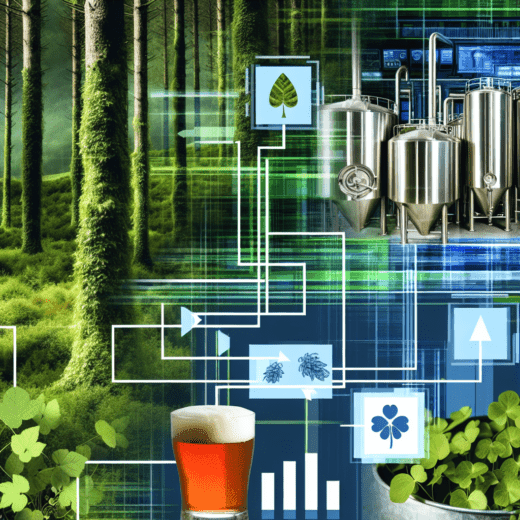Introduction to Forest-Based Craft Beer Brewing
The craft beer revolution has dramatically reshaped the brewing landscape, introducing small-batch brewing, unique flavor profiles, and innovative, artisanal methods to a global audience. Forest-based craft beer brewing is a particularly intriguing offshoot of this movement, drawing on ingredients sourced directly from the forest, including herbs, fruits, and botanicals. This burgeoning trend leverages the rich biodiversity of forest ecosystems to create distinctive flavors that stand out in the crowded marketplace. This post delves into the innovation potential of forest-based craft beer brewing, examining how it disrupts traditional markets while highlighting unique opportunities that this niche brewing segment offers.
Harnessing Innovation Potential in Forest-Based Craft Beer
Incorporating forest-grown ingredients can imbue beer with unique flavors and aromas that are unattainable using conventional ingredients. This approach capitalizes on the concept of “terroir” – the unique environment in which ingredients are grown, reflecting the climate, soil, and biodiversity of a particular locale. Craft brewers are harnessing terroir to create beers that not only captivate consumers with their taste but also tell stories of the lands from which they originate.
This innovation potential is further bolstered by technological advancements in precision agriculture and data analytics. By employing advanced agriculture technologies, brewers can precisely select and cultivate forest botanicals that offer optimal flavor profiles. This marriage of tradition and technology allows for new, bold experiments in brewing previously limited by resource availability and knowledge.
Market Disruption and Economic Benefits
The craft beer industry is renowned for its ability to disrupt traditional brewing markets. Forest-based brewing stands at the forefront of this disruption, offering a product that distinctly diverges from mass-produced beers. Consumers are increasingly seeking brands that offer authenticity, transparency, and unique experiences – attributes that forest-based craft beers can deliver.
Economic benefits also arise from this brewing style. By sourcing ingredients locally, brewers can stimulate regional economies, fostering closer ties between producers and consumers. Engaging with local foragers and farmers not only provides fresh and unique ingredients but also supports sustainable agricultural practices that protect forest ecosystems.
Key Challenges in Forest-Based Brewing
Despite the potential, forest-based brewing is not without its challenges. Sourcing ingredients from forests presents logistical and ecological hurdles. Sustainable foraging practices must be implemented to ensure that harvesting doesn’t deplete local biodiversity. Brewers must balance the demand for these unique ingredients with conservation efforts, adhering to stringent guidelines that protect forest ecosystems.
Moreover, scaling this niche brewing operation can be challenging. Unlike conventional brewing ingredients, forest produce can be highly seasonal and variable in availability and quality. Brewers must develop adaptable and resilient supply chains capable of managing these fluctuations while maintaining consistent product quality.
Strategies for Success in the Startup Ecosystem
Achieving Product-Market Fit
Achieving product-market fit is crucial for any startup. For forest-based brewers, understanding consumer preferences is key. Extensive market research can help identify flavor profiles that resonate with target demographics. Engaging directly with customers through tastings and feedback sessions can refine products and branding strategies.
Scaling Challenges and Solutions
Scaling a forest-based brewery requires careful planning. Establishing relationships with reliable suppliers of forest ingredients and developing partnerships with local communities can create a stable supply network. Additionally, investing in scalable brewing technology ensures that increases in production do not compromise quality.
Fundraising and Financial Strategies
Securing funding for a niche venture like forest-based brewing requires a compelling pitch that highlights innovation and sustainability. Investors are increasingly drawn to startups that emphasize environmental responsibility alongside profitability. Presenting a clear vision of how the brewery contributes to local ecosystems and economies can attract support from impact investors and grants focused on sustainable development.
Customer Acquisition and Marketing
Effective marketing strategies are essential for customer acquisition. Crafting a brand story that highlights the individuality and ecological benefits of forest-based brewing can engage consumers seeking authenticity. Utilizing social media and content marketing to share these stories amplifies reach and resonance among target audiences.
Unique Opportunities in Forest-Based Brewing
The uniqueness of forest-based brewing lies in its ability to foster community and sustainability. By engaging with local foragers and communities, brewers can create distinct products that are intimately tied to the regions they represent. This not only strengthens the brand identity but also promotes sustainable land use and conservation efforts.
Brewers can also harness the experiential aspect of their products by offering brewery tours or foraging events that teach consumers about the sourcing and brewing process. This experiential marketing can strengthen consumer loyalty and differentiate the brand amidst a sea of craft beer options.
Real-World Case Studies
Several startups have begun tapping into the forest-based brewing potential with notable success. Companies like “Foraged & Found Beer Co.” have pioneered the integration of foraged ingredients, crafting beers known for their exceptional taste and commitment to sustainability. These companies often collaborate with local researchers to ensure their operations are ecologically sustainable and continue to innovate on flavor profiles that reflect the terroir of their regions.
Academic research supports the benefits of this approach, with studies indicating that consumers are increasingly willing to pay a premium for products that offer unique flavors and adhere to sustainable practices. Industry reports likewise suggest that the demand for eco-friendly and locally-sourced products is on the rise, further solidifying the market potential for forest-based craft beer.
Conclusion: Crafting the Future of Beer
Forest-based craft beer brewing represents a compelling segment in the broader craft brewery revolution. With its innovative use of forest-grown ingredients, it disrupts traditional markets while offering unique opportunities for startups willing to navigate its challenges. By fostering sustainable practices and community engagement, forest-based brewing not only taps into consumer trends towards authenticity and sustainability but also contributes positively to local economies and ecosystems.
Through strategic planning, careful scaling, and effective marketing, forest-based brewing startups can carve out a prosperous niche. As the craft beer industry continues to evolve, those who can creatively adapt and integrate forest resources will not only thrive but also lead in shaping a sustainable future for brewing.

